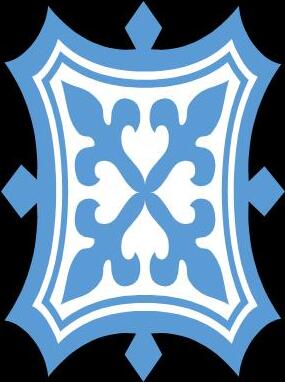

















 Civil War Soldier
Civil War Soldier
1841 1883




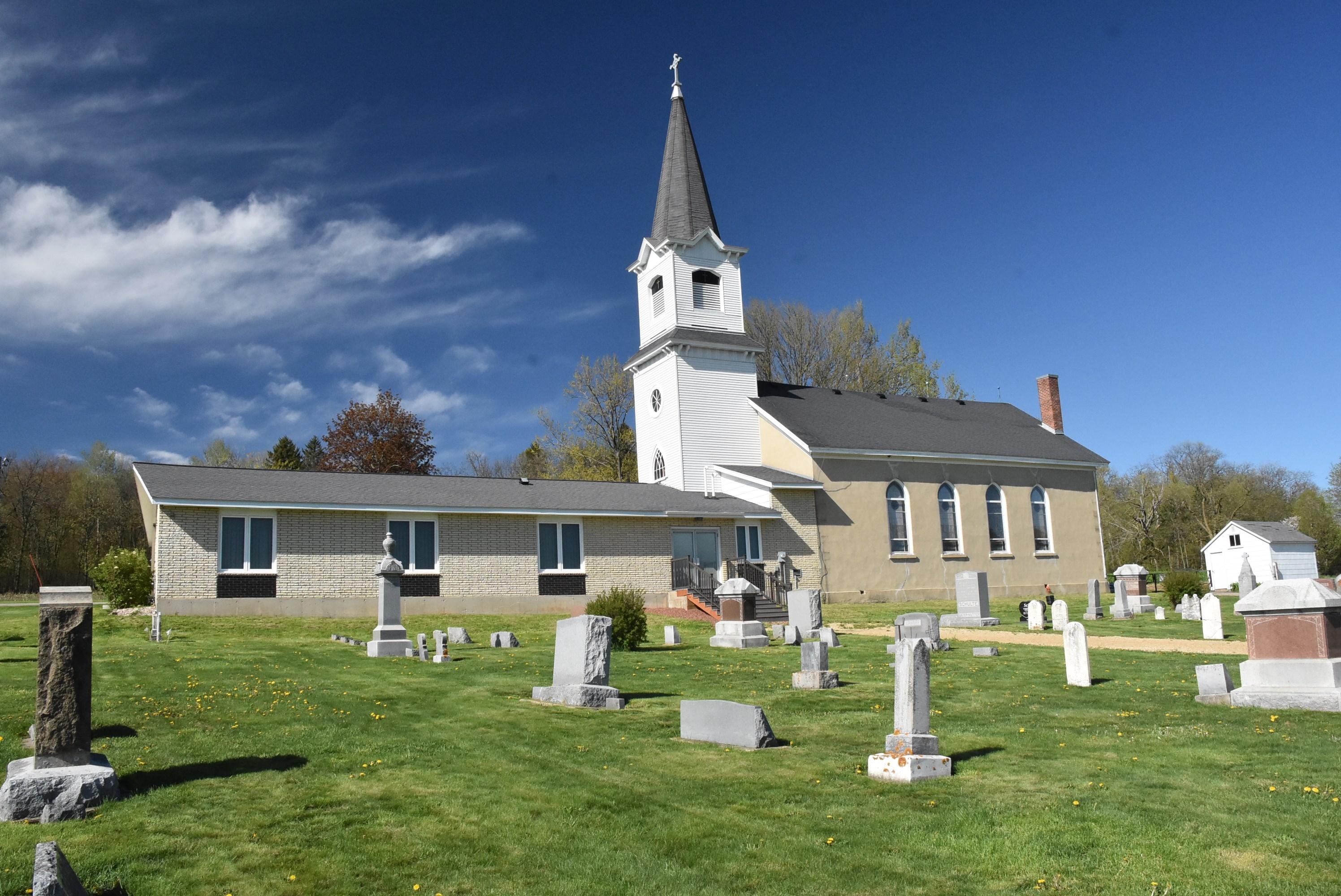

















John Obricht was born in Switzerland in 1841, and in 1858 he purchased a tract of land in Sauk Country. At the age of 23, he heeded the call when his country called in July of 1863, and served as a corporal during the Civil War. He was discharged in January of 1866, and went to live in Prairie du Sac, WI. In 1880 he was farming in Westfield, Sauk County, Wisconsin. By 1883, he had been married to Elizabeth Dussel and they were the parents of 7 children, aged 1 to 13.
A note of caution: Some of the details of the murder of John Obrecht in this publication are quite explicit, and may not be suitable for some readers.
Copyright 2024
Researched and compiled by William C. Schuette


Original document on the following page.
Honey Creek Township 1877
Range 4-E
Section 12 >>>
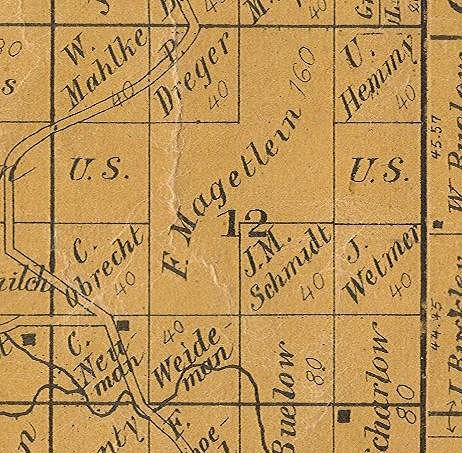
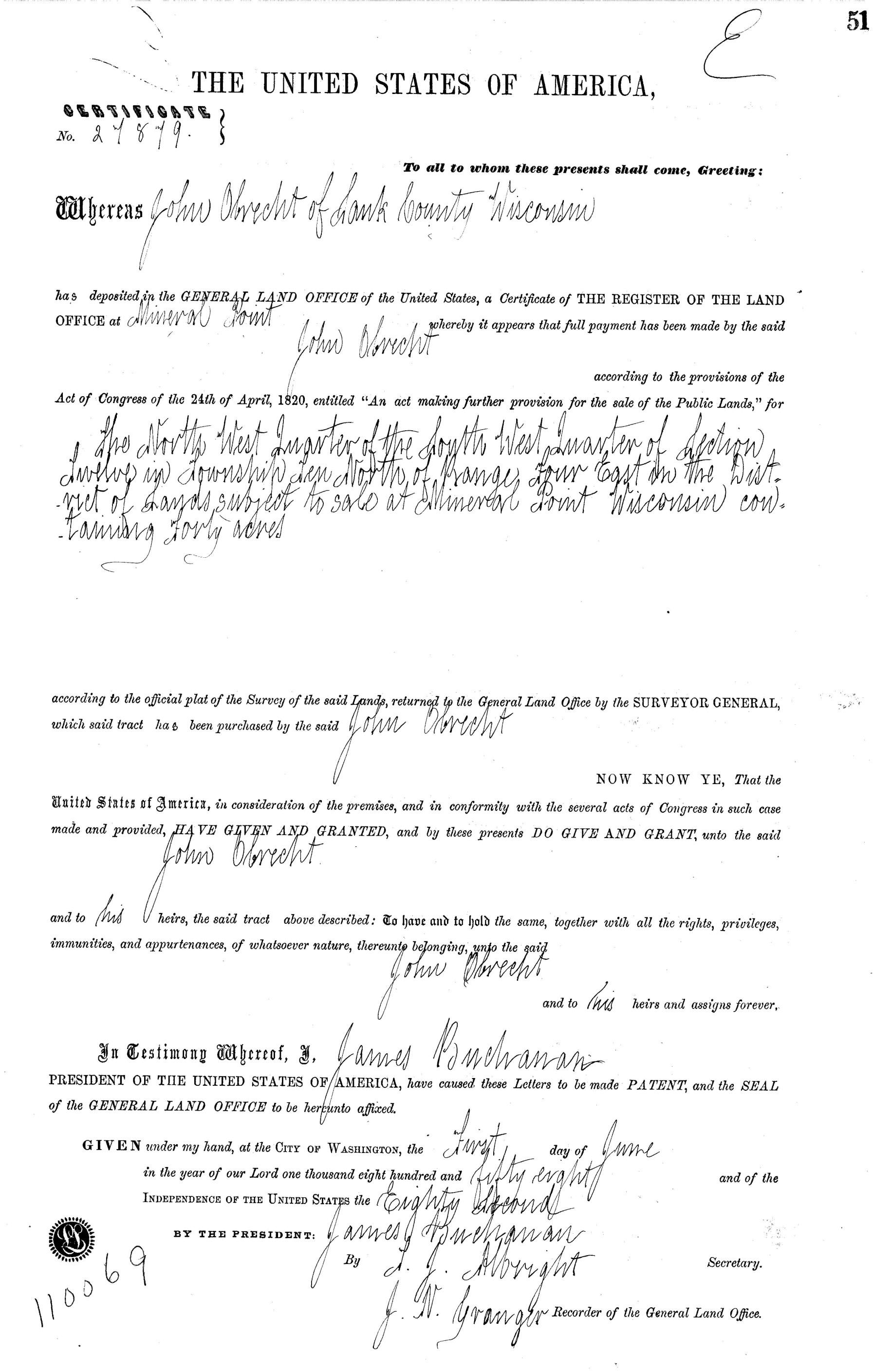



1860 Census Record on the following page.
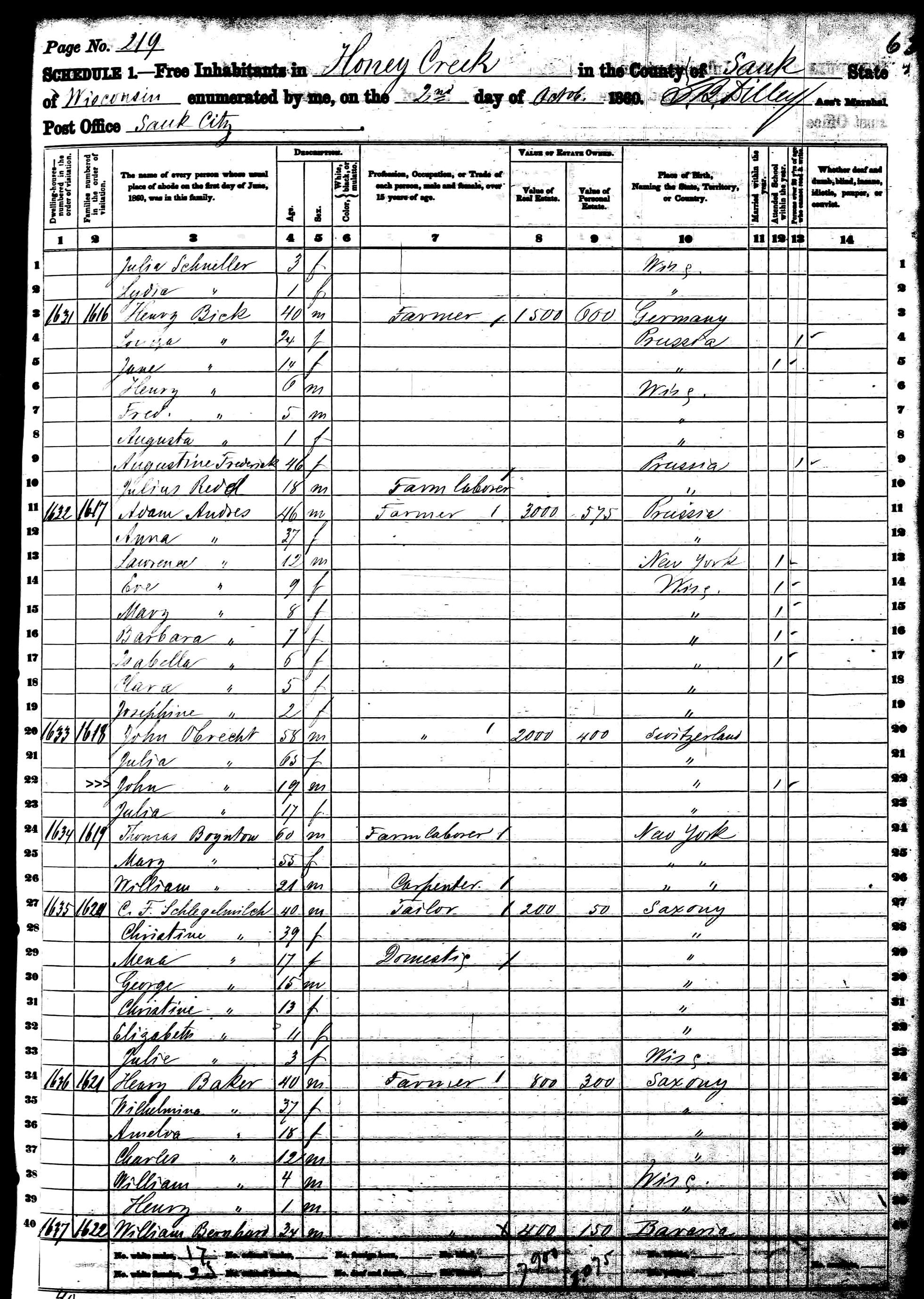
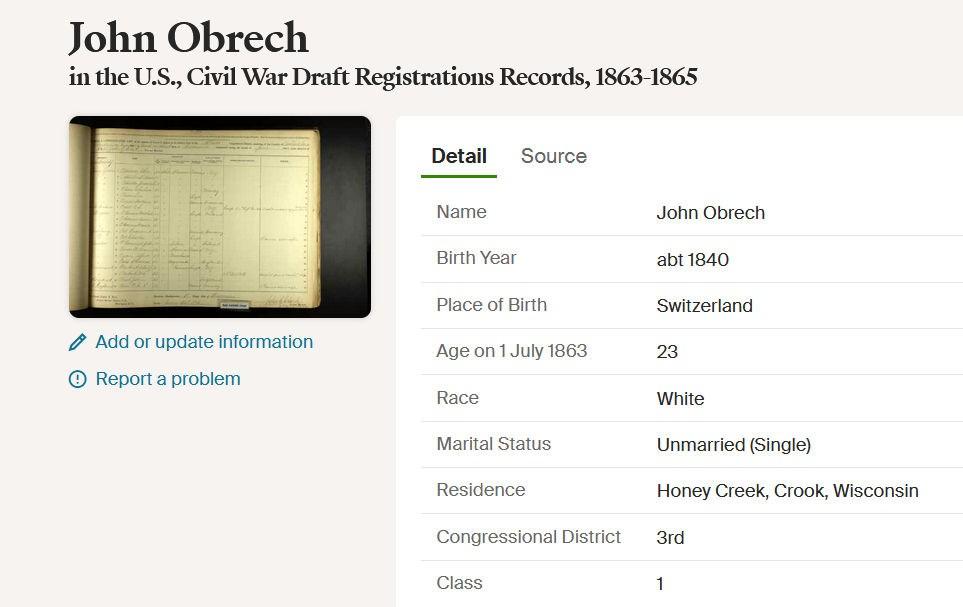

Civil War Draft Registration
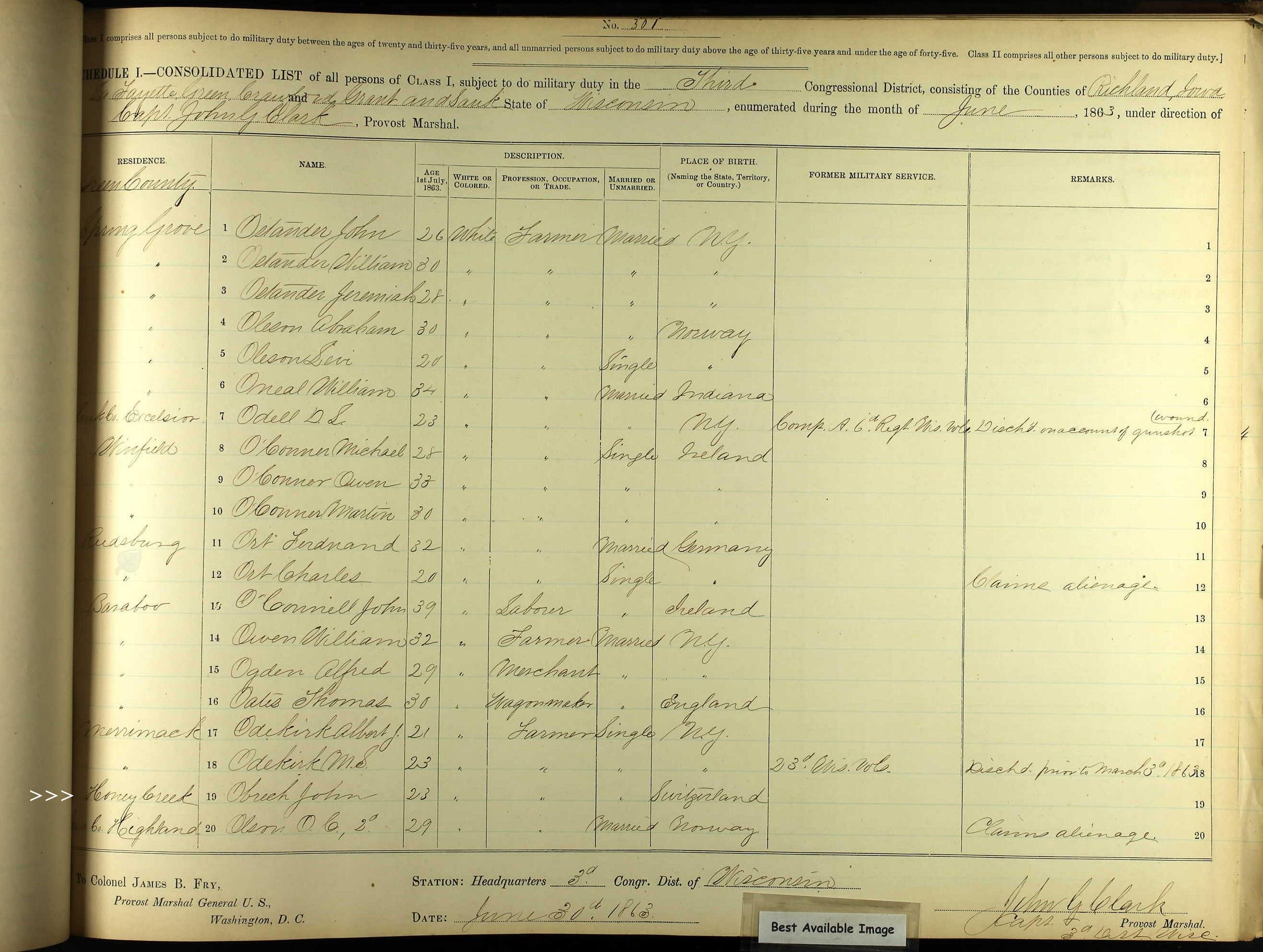
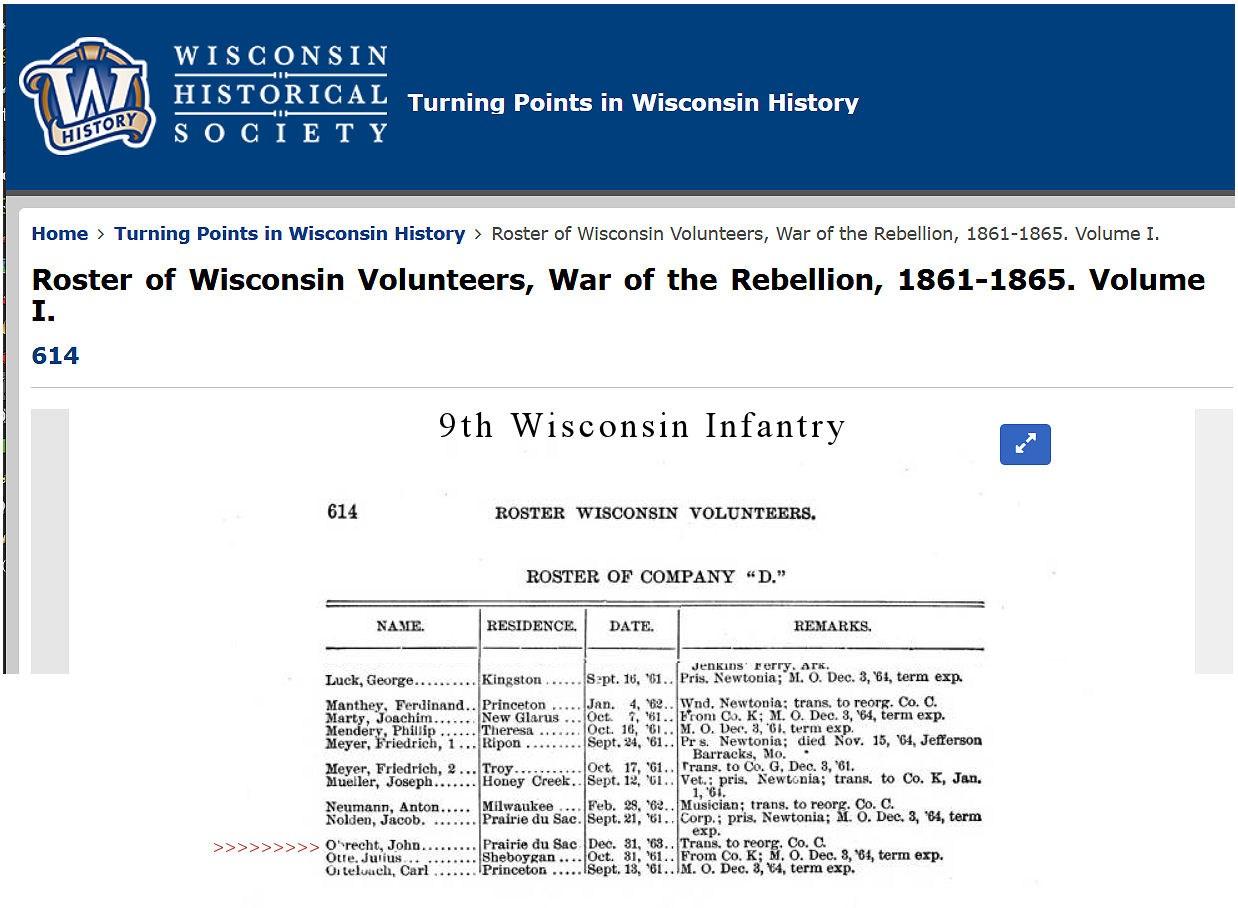

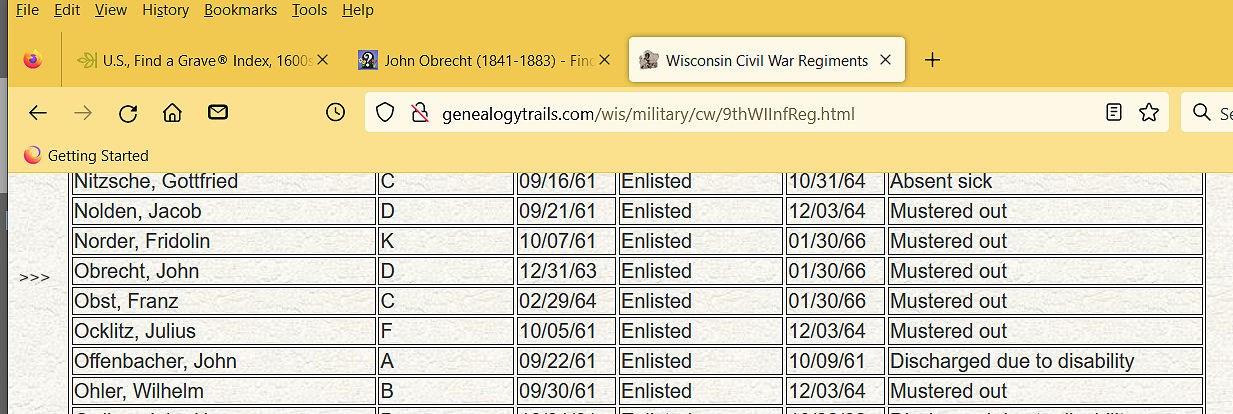



The 9th Wisconsin Infantry was organized at Camp Sigel, in Milwaukee, mustered into service on October 26, 1861, and left for Fort Leavenworth, Kansas, on January 22, 1862. From there it marched to Fort Scott, Kansas, conducted expeditions on the southern plains, and then moved through Missouri and Arkansas.
It participated in the Battle of Prairie Grove, Arkansas. The regiment mustered out of active service on January 30, 1866. It lost 191 men during service. Seventy-seven enlisted men were killed and 114 enlisted men died from disease. Source: Wisconsin Historical Society
Private John Obrecht enlisted in the 9th Wisconsin Infantry, Company D (later transferred to Company C) on 31 December 1863, where he served until he was mustered out on 30 January 1866. His journey during the Civil War is recounted in the movements of his unit which is taken from the “9th Infantry, chapter 17 from E.B. Quiner's Military History of Wisconsin (Chicago, 1866).” See the following pages. Source: Wisconsin Historical Society.
We begin the Civil War journey of Private John Obrecht on the following pages in January 1864, on the approximate date on which he would have become a member of the Wisconsin 9th Infantry, Company D.

Source: A Civil Discourse-A Civil War Era Blog
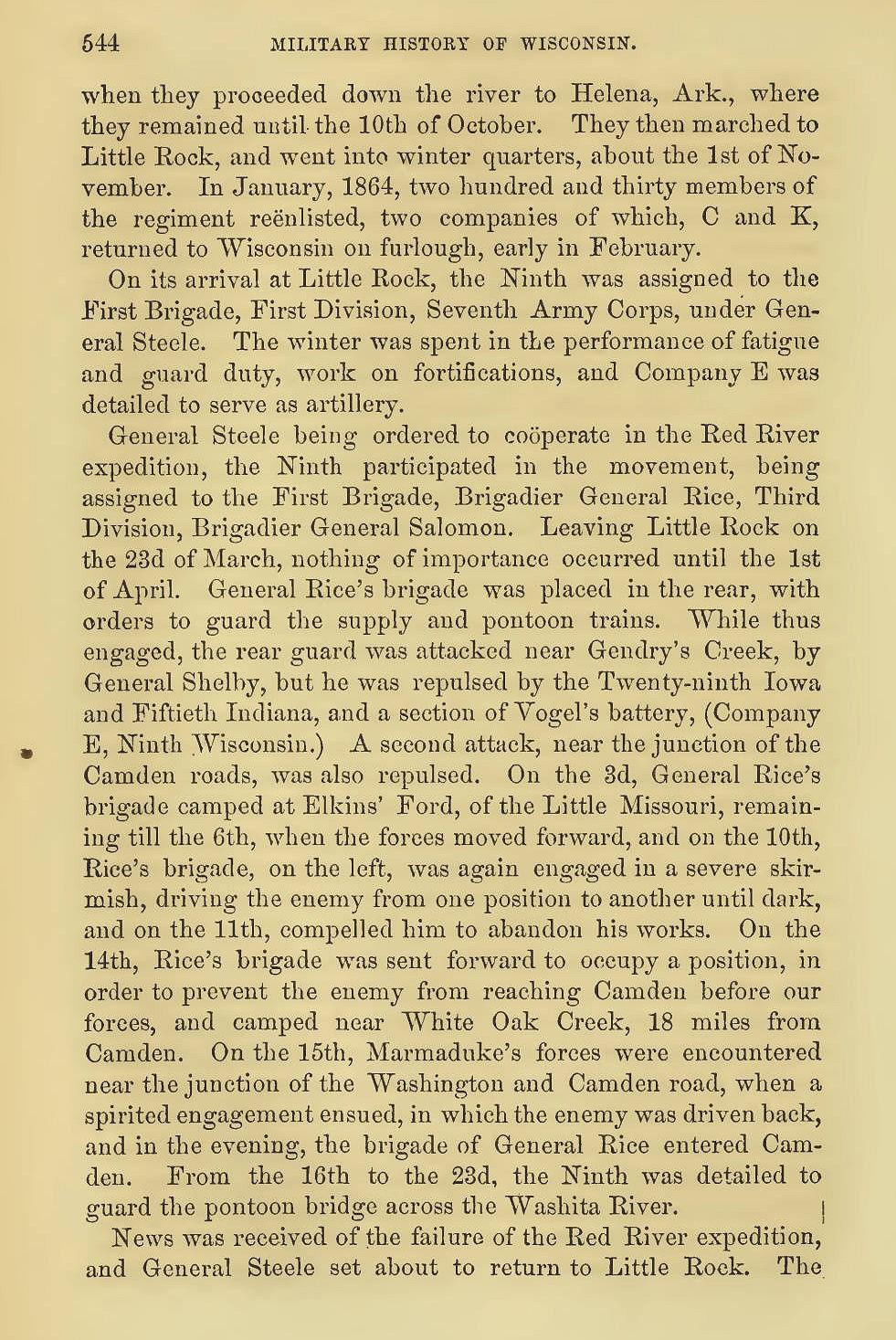
Source: Wisconsin Historical Society.
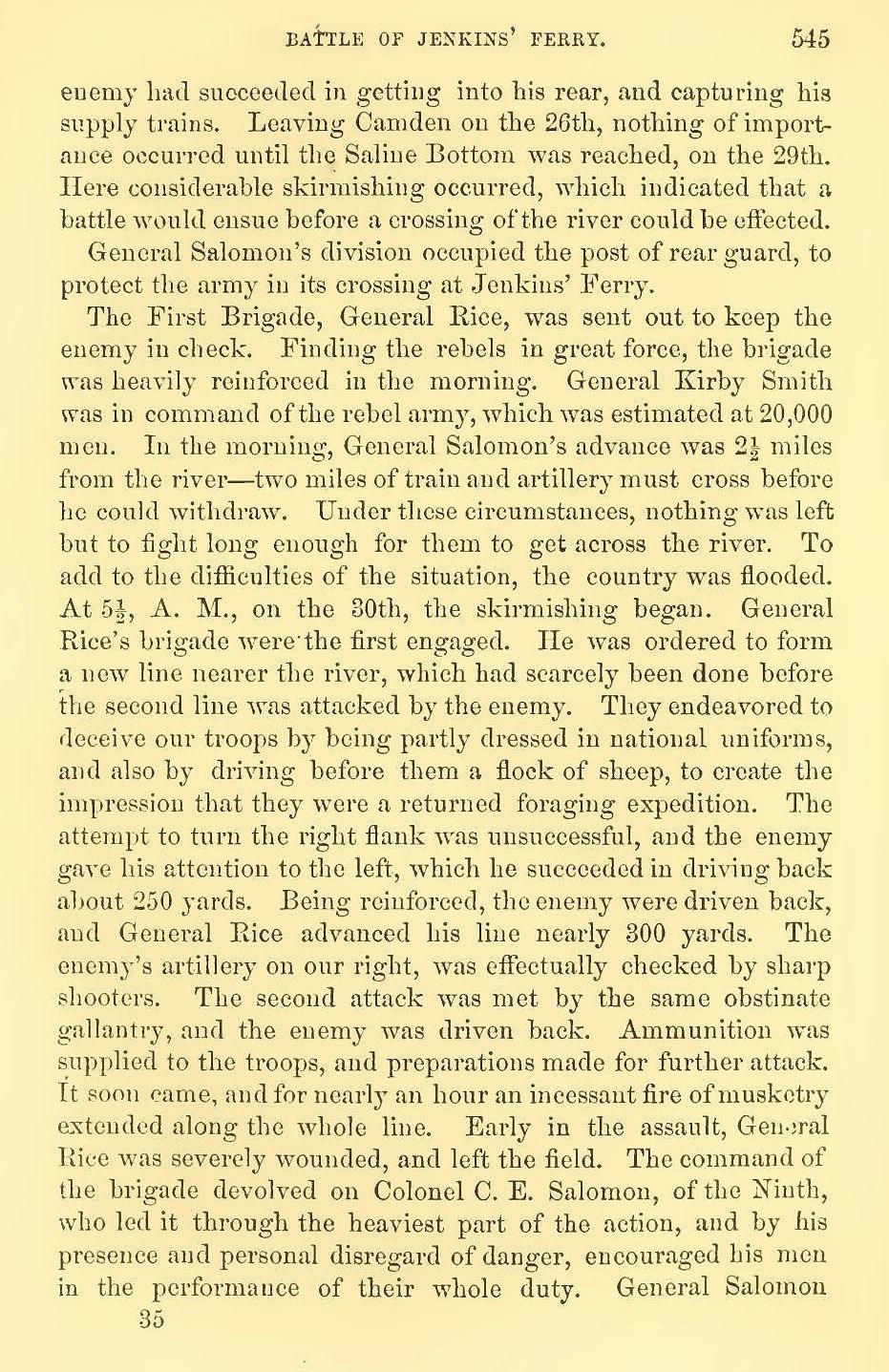
Source: Wisconsin Historical Society.
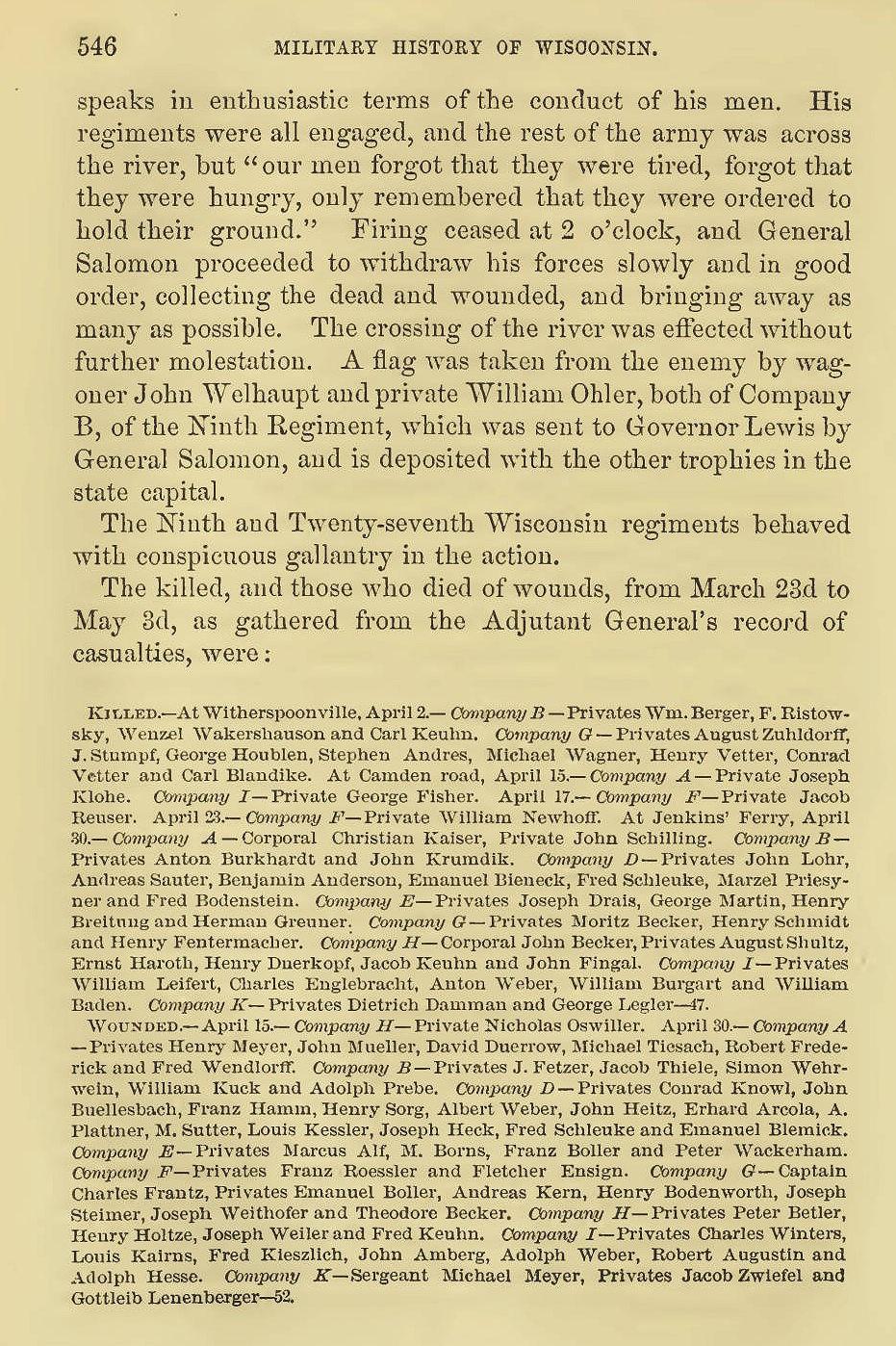
Source: Wisconsin Historical Society.
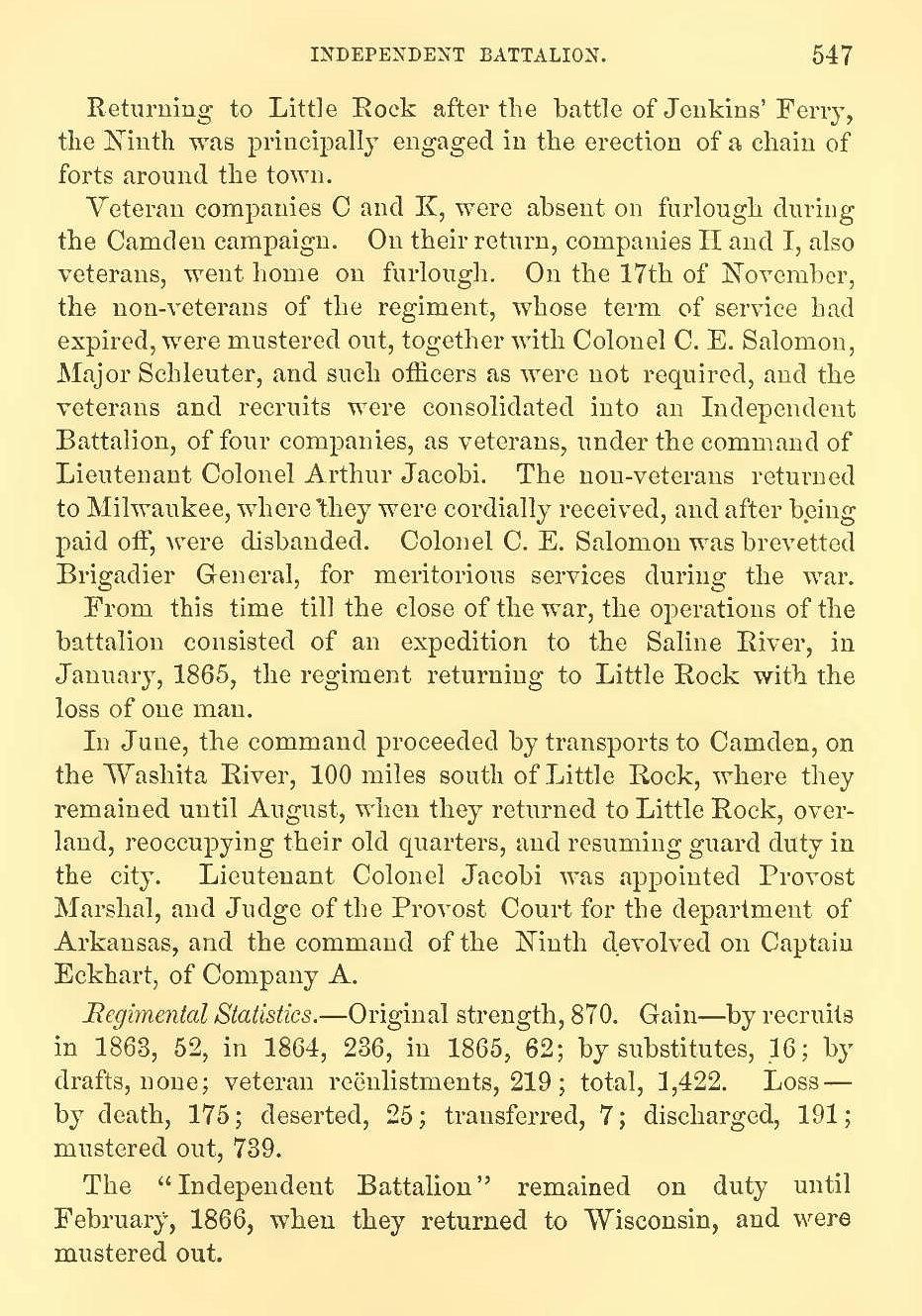
Source: Wisconsin Historical Society.
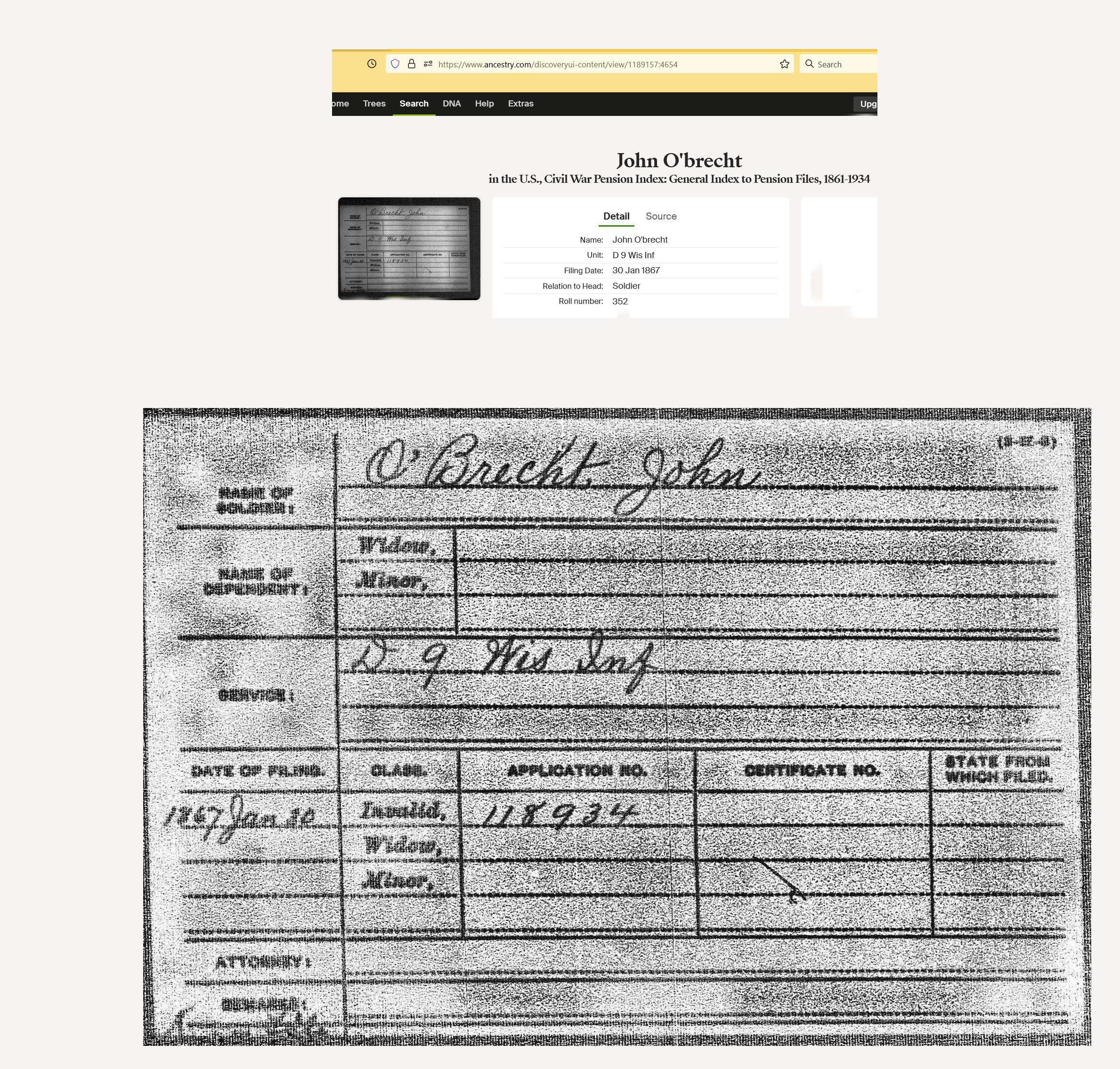

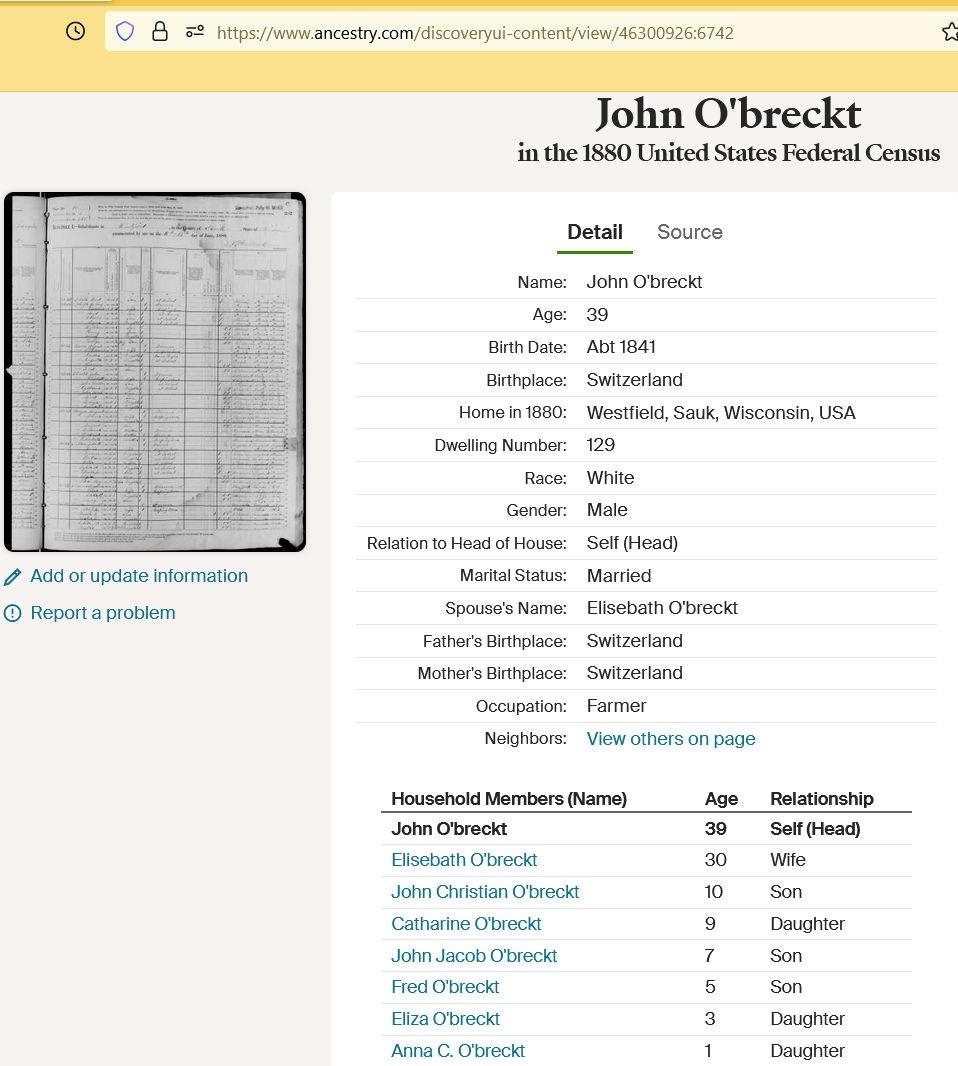

1880 Census Record on the Following Page
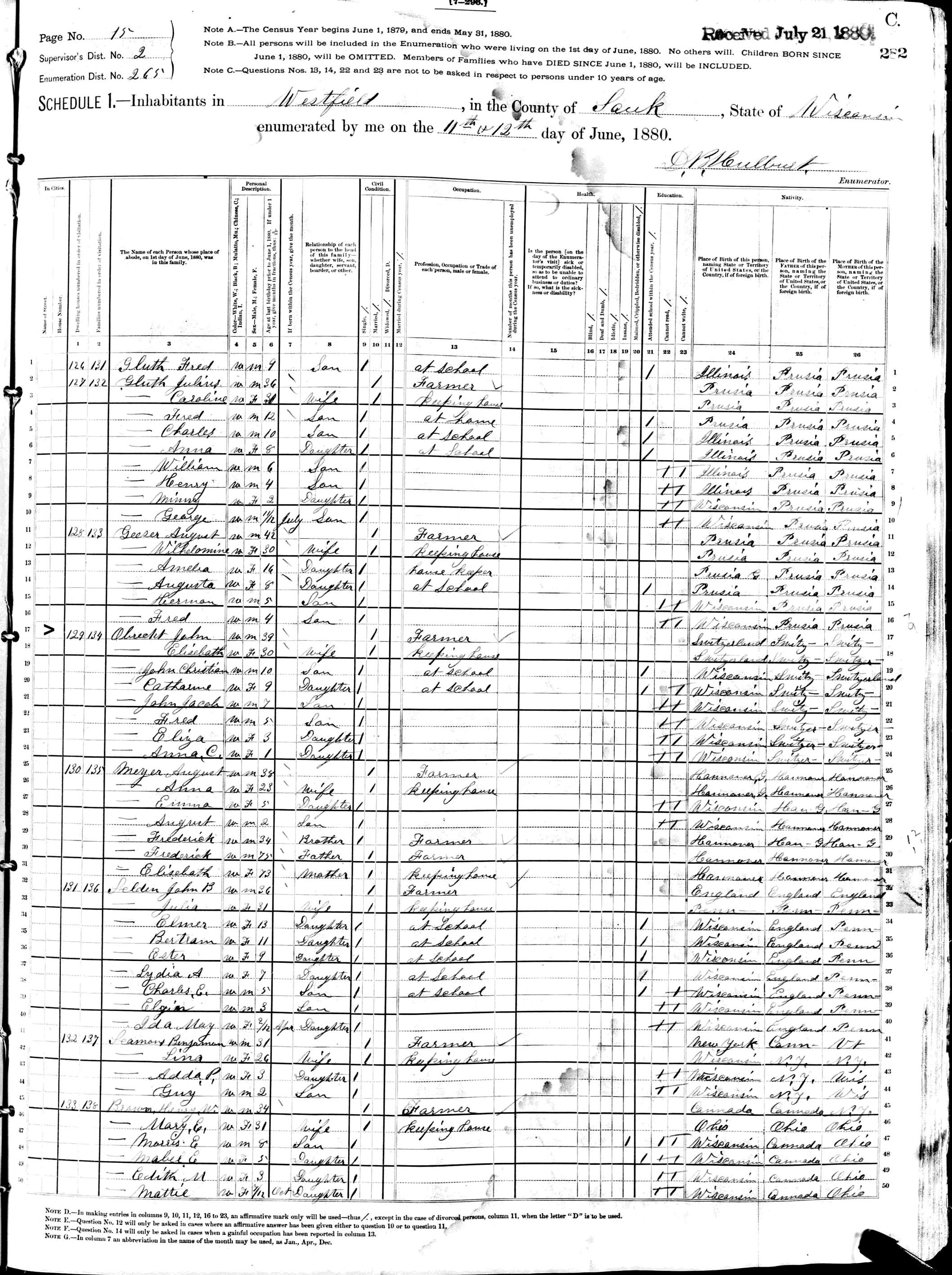

Reedsburg Free Press 30 August 1883
John Obrecht was found on a public highway in the above-named town Wednesday afternoon of last week with his skull crushed in and dead. The body was discovered near the farm of Gustav Funte by a peddler traveling that road, who when within a few rods of the corpse found it difficult to make his horse advance. He jumped from his wagon and found the dead man in the road. He at once returned to Loganville and gave the alarm. A jury was summoned consisting of C. Lewis, C. Thies, William Walter, William Schroeder, E. Dixon and Michael Coan who went out with Henry Verthein, Constable, and George Koenecke, a special constable, to act as the law directs. By a postal card in the pocket of the dead man it was found the deceased was John Obricht, whose farm was about three miles from where he was found dead in the road. Constable Verthein at once proceeded to the farm of the deceased, where he was informed by Mrs. Obrecht that her husband went to Baraboo on Tuesday, expecting to draw his pension, but had not yet returned.
The officer, not being quite satisfied with the information given examined the outbuildings and coming to the smokehouse he discovered a very disagreeable smell there, like that near the body of the murdered man. He returned to the jury and together they returned to the house. They noticed the floor in the dwelling had recently been mopped and the lumber wagon standing near had been recently scrubbed out. Mrs. Obrecht explained that she had cleaned her floor on Monday and the reason she had the lumber wagon washed was because her brother, Christian Duessel, had used the wagon hauling out manure. Constable Verthein and George Koenecke then went to Dussell’s farm and found him and his niece a daughter of the deceased carrying manure in bushel baskets out in the field. When they observed two men coming through the woods they threw away their forks and baskets and started off on a run but they were soon overtaken by the officers, who proceeded to calm their fears by saying there was no danger at all, although
they might know of their relative being murdered and by whom, the punishment would be slight provided they would confess and give their reasons. Duessel seemed much pleased at George Koenecke’s words of comfort as to punishment and finally confessed that he committed the murder because his brother-in-law had threatened to kill his sister, Mr. John Obrecht. A number of other statements made at the same time goes to show it was a premeditated murder, planned long ago.
The woman and her brother were arrested and after due examination at Loganville, on Monday last, by District Attorney Cheek, they were incarcerated in the county jail at Baraboo on Tuesday, to await trial at the next term of court, which convenes next month.
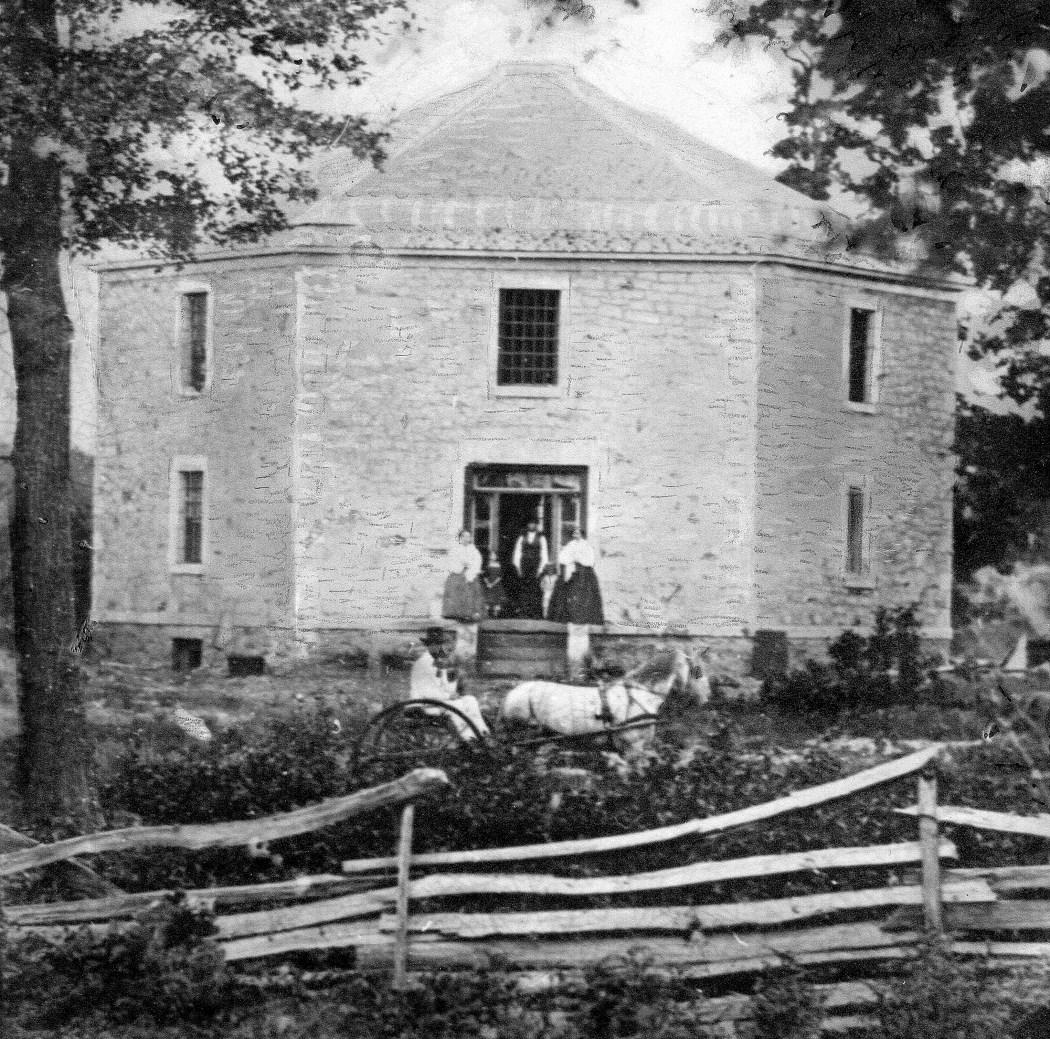
The Sauk County Jail in Baraboo, WI, in 1883.
Source: Sauk County Historical Society
The Green Bay Press Gazette August 30, 1883
Baraboo, Aug. 29 Christian Dussel, who is confined in the county jail for the murder of John Obrecht, to which crime he has confessed, says that on Sunday, Aug. 19, Obrecht made threats that he would kill all of his family, pile their bodies up in the house and fire it. Mrs. Obrecht was so frightened that she came over and requested him, Dussel, to watch around the house that night. He did so, and shortly after midnight he heard an alarm in the house, ran up and saw Obrecht with his wife on the floor choking her, and ready to strike her with a heavy stick of wood. At this he ran in and struck Obrecht below on the head with a short handled ax that he had picked up beside the house. This blow killed him at once, and he nor any one else struck him again. The body was then taken to the smoke house, Mrs. Obrecht aiding him in this. The body laid in the smoke house one day, or possibly two, then the two loaded it into the wagon and removed it to the place on the road where it was found. In the preliminary examination the wife testified to threats, to going and asking counsel of her mother and requesting her brother to come over and protect her. She also testified to the choking of herself, and the position of Obrecht as being in readiness to strike her with a stick of wood. As to the number of blows struck him she could say nothing, as she had fainted away with fright. She testified to placing of the corps in the smoke house by herself and Dussel, Sunday night, where it lay till Tuesday night, when it was conveyed in a wagon to the place where found, by her self and Dussel. She also testified that Obrecht was dressed to leave as soon as he had accomplished the killing of herself and family. Her son testified to the killing of the father by Dussel, and says more than one blow was given; also to hearing threats made by the father to kill them all, and in aiding in removing the body at the command of his elders. The condition of the body does not corroborate much of this testimony, except the time of the deed. The head was literally mashed on the left side, the clothing indicating it had been put on [Obrecht] after the deed, as the hat was not crusted and the outer garments were not stained with blood.
The Green Bay Press Gazette August 30, 1883
Hon. Nels. W. Wheler, the humorist-lawyer, of Baraboo, is in the city to-day, and his cheery voice has greeted many of his warm friends here. He has been assisting the district attorney of late in prosecuting in the circuit court for Sauk county, the case of the state against Christian Dussel and Elizabeth Obrecht, charged with the murder of John Obrecht the 19th of last August, which resulted in the conviction of Dussel for manslaughter and the acquittal of Mrs. Obrecht. Mr. Wheeler naturally feels gratified over the result, thought he believes that the woman was guilty of the offense charged, but adds that the testimony advanced would hardly have warranted her conviction.
August 29, 1883
A word of caution, this description is rather graphic.
A foul and Shocking Murder in the Town of Westfield
News was received in this city several days ago of finding of the body of a murdered man by a traveler on his way from Reedsburg to Westfield, on the 21st. At the inquest, which immediately followed the finding of the body, held by D.B. Hulburt, of the last named town, and which was contained until Saturday evening, facts were developed which threw suspicion on Christian Dussel, a brother-in-law of the victim. Dussel was arrested, as also was Mrs. Elizabeth Obrecht, the murdered man’s wife and sister of Dussel.
On arrest being made Dussel confessed to the murder of Obrecht. The cause assigned by Dussel for the deed is menacing language used by Obrecht toward his wife, he threatening her life and the life of her children, and to prevent Obrecht from carrying this threat into execution he killed him with an ax Sunday morning. The body was then secreted in a smoke house, where it remained until Tuesday, when it was taken out and placed in the road where it was found, some three miles from Obrecht’s house. (There are many other stories afloat which we do not feel at liberty to use.) the murdered man was a farmer, and a brother of Christian Obrecht of Sauk City.
At an examination held on Monday at Loganville, before Esquire Hulburt, District Attorney Cheek being present on the part of the state, Dussel and Mrs. Obrecht were bound over to the next term of the circuit court, and were lodged in the county jail by the Sheriff yesterday. Both of these persons are past middle age.
Following is Mr. J.D. Helm’s account of finding the body:
On account of the statement made in the last issue of the Sauk County Democrat, I think it proper to make public the circumstances regarding my finding of the body of the murdered man in the town of Westfield last Wednesday. I left my home in this place during the forenoon of Tuesday, the 21st. I drove to Reedsburg, and remained there that night. The next morning started for Westfield to finish up my work of distributing bibles in that township. As I was driving north on one street I came to a road leading to the right which I judged would take me to some houses I saw off to the east. as I reined my horse into this road she acted startled, and on looking about to see the cause, I saw about one rod ahead of me the body of a man, the appearance of which told me he was dead; also the stench was sickening. I wheeled around and drove as fast as possible back to the house at which I had last called, told what I had discovered, and accompanied by four members of the family went back to look at the body. The features were o mangled and black as to be unrecognizable. This was about five in the afternoon. In the course of an hour I notified others and told them to send for the nearest officer.
At the inquest the next day, the following facts were brought out: The officer on examining his pockets found a card with his name on, and it was known then that he was a resident of the neighborhood. They next called on his wife, who stated that he left home early Tuesday morning on foot for Ableman, and told her that he might not be back for two or three days. She identified the body by the clothing. She said he had no money when he left home.
The left side of his face and skull were broken in, and the brains protruding, also a hole in the left side which was supposed to have been cut. His name was John Obrecht. He leaves a wife and seven children.
Baraboo Republic
March 26, 1884
The chief interest at the circuit court which adjourned on Monday evening, was the trial of Christian Dussel and Elizabeth Obrecht for the murder of John Obrecht, in the town of Westfield, on the 19th of august last, the courtroom being closely packed with spectators from the time the case was begun to the end. The case was ably prosecuted by District Attorney Philip Cheek Jr., assisted by N.W. Wheeler, Esq., while G. Stevens and J.W. Lusk appeared for the defense.
The sickening details of this horrible crime are fresh in the minds of the people of this county and need no recapitulation.
A jury was impaneled on Friday last and the case given to the jury Monday afternoon at 4:50. Shortly before seven o’clock the jury returned with a verdict of manslaughter in the second degree against Christian Dussel. Elizabeth Obrecht was found, according to the evidence given, not guilty. The court sentenced Dussel to seven years at hard labor in the state prison at Waupun, the first ten days of such confinement and the first ten days of each succeeding three months during the first year to be solitary confinement.
Possible reasons that Elizabeth Obrecht was found not guilty, may have been that she had seven children ranging in age from four to thirteen to care for. Also, the lives of her and her children had been allegedly threatened by her husband.
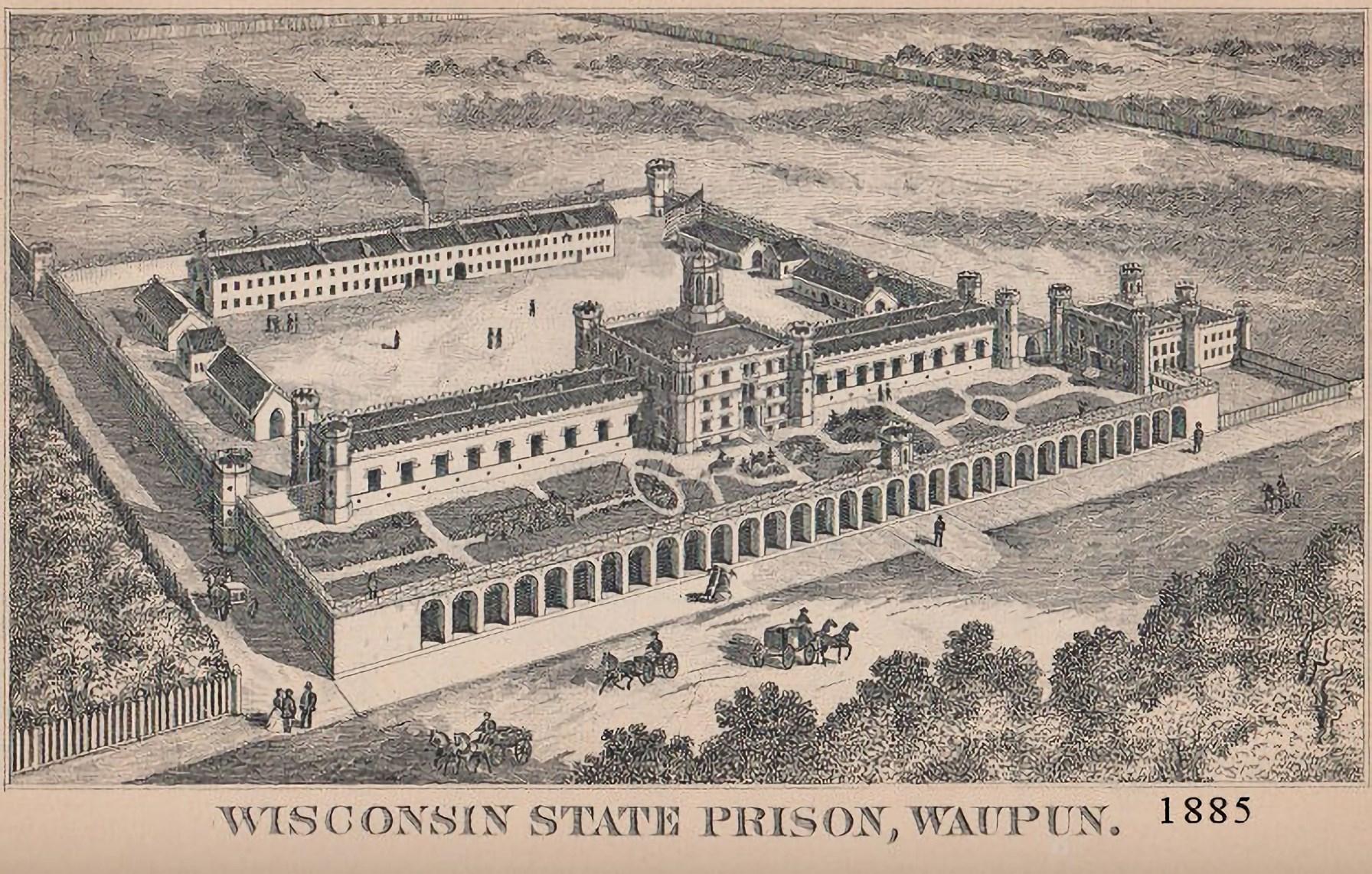



30 August 1883
Reedsburg Free Press
Baraboo Republic August 29, 1883
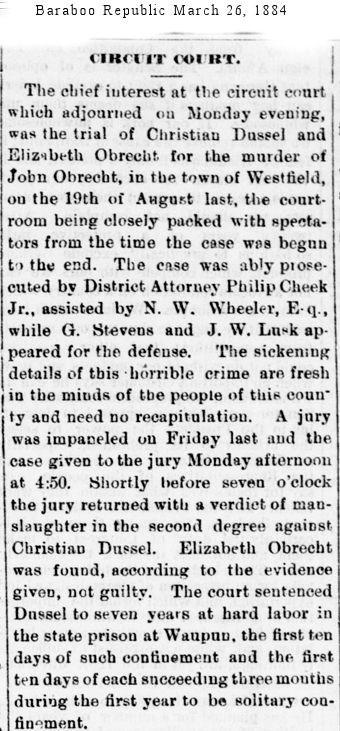

Transcription of the article on the left is on page 18, the article above is on page 21, and the article on the right is on page 20.



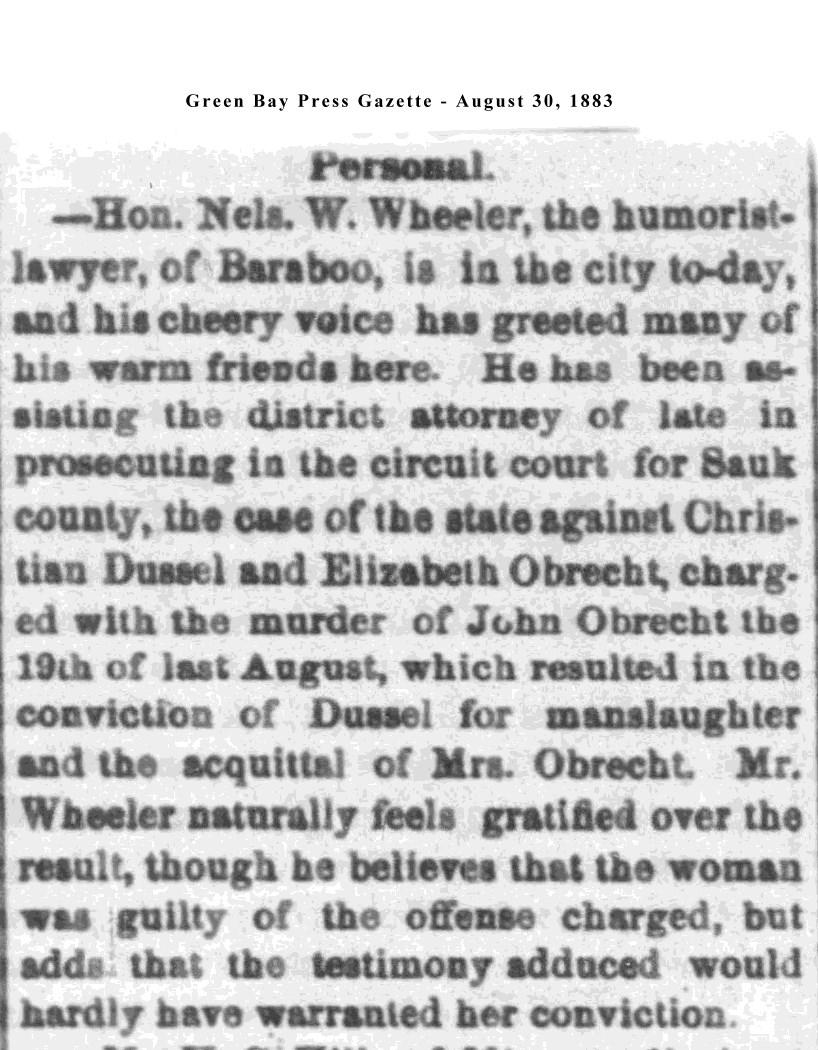

Green Bay Gazette August 30, 1883
See page 20 for a transcription of the left article, and page 19 for the above article.
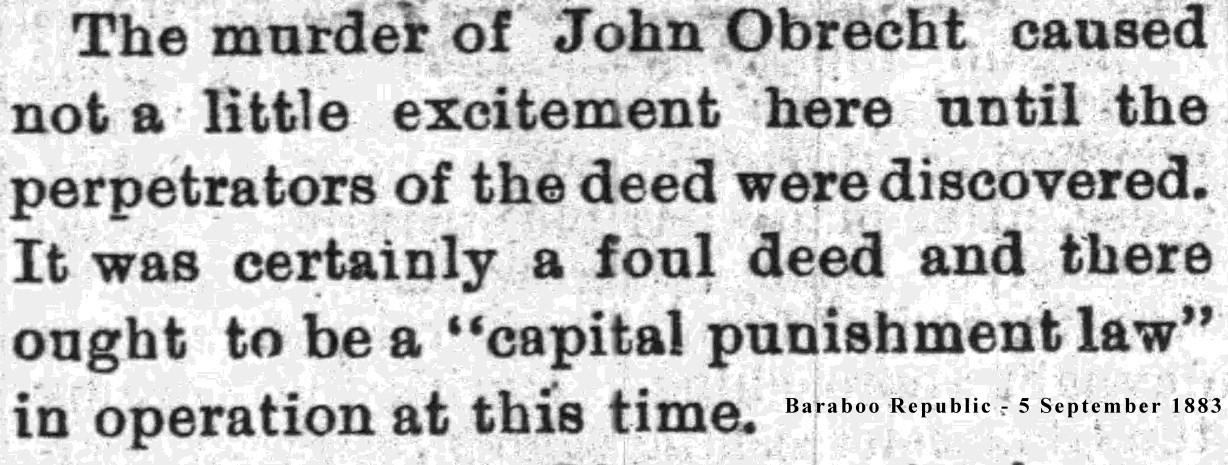

Baraboo Republic 5 September 1883
Baraboo Republic 29 August 1883
Reedsburg Times Press – August 31, 1972
Loganville Man Recalls Past in Interview with T-P Albert Koenig interview (Excerpt)
Just west of our church [Zion Lutheran Church] where about ten graves with markers, later somebody destroyed these markers. One of these graves contained the body of Mr. Upricht [Obrecht], who was brutally murdered.
When Mrs. Upricht was living on a farm now owned by the Adelmer Knuth family, she decided to get rid of her husband. He received a pension as he was a Civil War veteran. She asked Frederick Westerfeld to do the job. He was a man who liked money, and she offered him a good price, which he accepted. Later he got cold feet and could not do it.
Mrs. Upricht and Westerfeld were sisters, and he went to her brother, Duessel. He would do the job for her. Mr, Upricht always took a nap at noon on a couch, so Duessel went over and hit him with an ax. He stumbled out of the house and died. Then they put him in the woodshed and decided just how to dispose of the body. They put him in a wagon pulled by oxen and drove it quite a distance.
When it was almost morning, they dumped him in a wagon rut, so it would look like somebody had driven over him (right near the Funte and Wollschlager farm). The first one who came along was a Bible salesman. He certainly was pretty near scared to death! Then they notified Sheriff Verthein of Baraboo, and he made the investigation. When he was Investigating, he saw a wagon that was washed very clean and asked the boy why this wagon was washed. The boy told him that they hauled manure at his uncle's farm. When Mrs. Upricht heard this, she quickly sent one of her boys across lots, through fields, to tell her brother to haul a little manure, in a hurry, to the field. The sheriff took his time, and when he came to her brother's farm, he saw him throw a basket in the woods. One question led to another, and the murder was solved.
It has been mentioned in one of the newspaper articles that John Obrecht was abusive to his wife and children, and that was one of the reasons for the actions of his wife. At the trial, it was noted that the, “...menacing language used by Obrecht toward his wife, [and] threatening her life and the life of her children, [and] to prevent Obrecht from carrying this threat into execution,” she hired her brother to commit the crime.
Many soldiers from the Civil War, as from all subsequent wars, returned from active duty with some mental impairment today described as Posttraumatic Stress Disorder (PTSD).
Posttraumatic Stress Disorder (PTSD) is a psychiatric disorder that may occur in people who have experienced or witnessed a traumatic event, series of events or set of circumstances. An individual may experience this as emotionally or physically harmful or life-threatening and may affect mental, physical, social, and/or spiritual well-being. Source: American Psychiatric Association
Some of the symptoms are listed below:
• Being easily startled.
• Feeling tense, on guard, or on edge.
• Having difficulty concentrating.
• Having difficulty falling asleep or staying asleep.
• Feeling irritable and having angry or aggressive outbursts.*
• Engaging in risky, reckless, or destructive behavior.*
There is no way of knowing if John Obrecht suffered from PTSD or something akin to it as a result of his experiences during the Civil War, but it might help explain the mistreatment of his family members during his later life.
*Possible symptoms which may have led John Olbrecht to abuse his family.




Johann Obrecht is number 5 above.
5. Johann Obrecht, born on 18
Died on August 19, 1883 at night (murdered in his house by C. Düssel) was buried in silence on August 23 in the evening after sunset.
Funeral text in Hebrews 9:27 it is appointed unto men.
Hebrews 9:27 “And just as it is appointed for mortals to die once and after that the judgement.”


This memorial tombstone was installed in the cemetery in May, 2024, as there was no visible marker for Mr. Obrecht. It was rumored that Obrecht was buried just to the west of the church along with several other members. Over time, the tombstones became weathered and the information carved into the sandstone markers had become illegible. Eventually, these stones were tossed over a nearby fence.
Then in 1972, a new addition was added to the west side of the church, which unknowingly, was built over the purported location of several of these grave sites, including that of John Obrecht. This new marker is located near where he was originally buried, on the west side of the 1972 addition.
